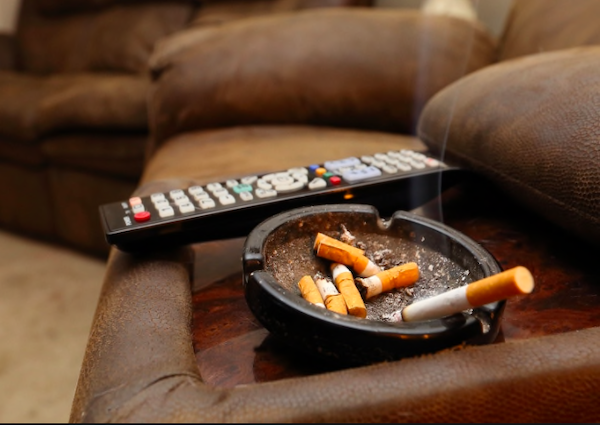
Just as West Hollywood’s City Council was set to take the final vote Monday on its controversial plan to totally ban tobacco smoking in all apartments and condominiums in one year, the plan was tabled when loopholes landlords could exploit to evict people were uncovered.
The Council was set to take a second and final vote on the tobacco smoking ban which would have established March 1, 2022 as the date when all tobacco smoking in multifamily buildings citywide would be outlawed. As part of that ban, the Council also declared that tobacco smoking was not a nuisance which could be used as grounds for eviction.
However, Councilmember Lauren Meister found several places in the city’s rent control ordinances which would have allowed landlords to evict people for smoking once the ban went into effect, despite the clause about smoking not being considered a nuisance.
“This ban is setting up 5,000 plus people for eviction,” said Meister. “Although code compliance is saying it’s not enforceable by them, landlords can go to court with this. The city’s own rent stabilization ordinance allows this. If we think landlords won’t use that to evict smokers so they can raise the rents and get new tenants . . . this ban really presents an opportunity to abuse the system.”
Meister recommended the Council return to the original plan of allowing existing tenants to continue to smoke tobacco in their units, but once they vacate the unit, it would automatically become a non-smoking unit. That plan did not present eviction loopholes for landlords to exploit.
Councilmember Sepi Shyne said she was having reservations about the one-year deadline to make people stop smoking tobacco. She reminded that nicotine is an addictive substance and West Hollywood has long established itself as a compassionate city toward addictions. Consequently, she felt the city would need time to get smoking-cessation programs in place before establishing a deadline for residents to quit.
“Twelve months is just a very short amount of time to get everything in place for our residents who are dealing with an addiction,” said Shyne. “This is not a morality issue, ‘you’re smoking, you’re a bad person.’ This is an addition. To expect them to just quit vs. being penalized, I would like us to consider . . . extending the time, a reasonable amount of time, to really allow people to have the chance to be able to quit rather than face fines.”
Shyne also noted that 12% of residents are disabled and some of those disabled people also smoke cigarettes. She pointed out that disabled residents, especially those who live on upper floors, might have difficulty going to the sidewalk for a cigarette. She recommended the city should include exemptions for disabled people.
Similarly, Meister noted that sending residents to the street for a cigarette late at night could put them at a public safety risk for muggers and thieves who might attack them. That could set the city up for lawsuits.
Both Shyne and Meister suggested the total ban needed far greater consideration than the Council had given the matter in its haste to pass a total smoking ban at its March 1 meeting.
The other councilmembers agreed the total ban needed more deliberation, but also wanted the other parts of the apartment smoking ban passed quickly.
As a result, City Attorney Lauren Langer will bring back the revised smoking ban in two parts for the April 5 Council meeting.
One part will include all the items the five councilmembers agree with – banning smoking in common areas of apartment/condo buildings, banning tobacco smoking in all new residential buildings and banning tobacco smoking for all new tenants 90 days after the final passage of the ordinance.
The second part will be the one where the Council debates how and when to phase out smoking for all existing tenants.
An estimated 15% to 20% of West Hollywood residents are tobacco smokers.
Single-family homes and duplexes are exempt from these ordinances, as are special needs housing facilities for people with disabilities, including substance addiction.
Smoking cannabis is not affected by this ordinance, only smoking tobacco. People will be able to continue smoking marijuana in their units even if tobacco smoking is banned.
By making that distinction between smoking tobacco and cannabis, the city is making itself ripe for lawsuits over the smoking ban. State law dictates that marijuana cannot be smoked anywhere tobacco smoking is prohibited.
The road to the apartment/condo smoking ban has been a long and twisting one. In Aug. 2020, the Council agreed to separate smoking tobacco from smoking cannabis and to only consider a tobacco smoking ban, despite the state laws. With the city’s long history of being pro-marijuana, the Council could not justify suddenly banning residents from smoking cannabis in their units.
At its Feb. 1 meeting, the Council voted to make a total apartment/condo tobacco smoking ban a goal the city should work toward at an unspecified date in the future.
Then at its March 1 meeting, the Council abruptly reversed course and hurriedly voted 4-1 to implement the total smoking ban in one year. This was done in a less than transparent manner without any advance notice to the public.
Councilmember John Erickson pushed that one-year date through, saying it was not necessary to get any public input on the matter and city staff would be able to figure out the particulars of the ban after the fact.
